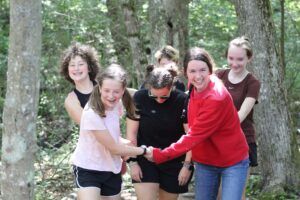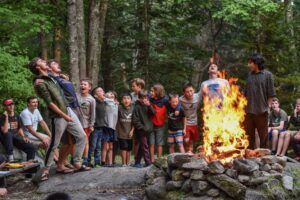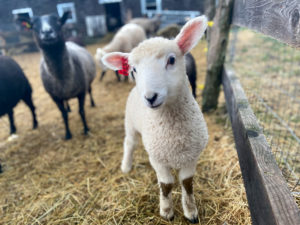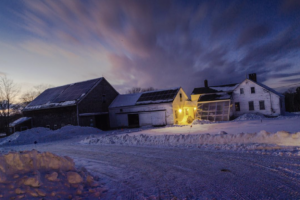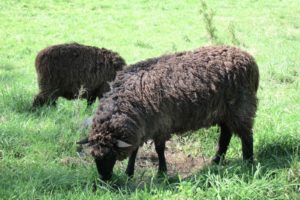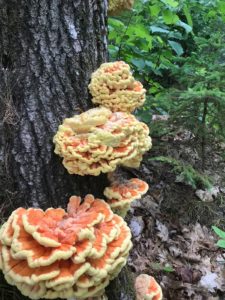I am just finishing a quick breakfast after morning chores. I do morning chores most every day of the year, starting somewhere between 5:40 and 6:45, depending on the season. The work becomes routine – rote, even. And then there is a morning like this one, when no less than 20 campers showed up to help at 5:40 am. Five tromped out to pasture with me to set up fencing, move the cows and sheep onto new pasture, and bring Sal into the barn. Others moved chicken tractors and fed our meat birds, who will next week feed us. A small pack fed the turkeys and laying hens before transitioning to milking Halo the cow. A gaggle of boys headed up to tend to the pigs in their wooded pasture. Mornings like this – so many moving parts, so much work done meaningfully and well by so many hands, some of them quite little – wake me up.
Today the boys fired questions at me as we walked across pasture: How old is Sal? How old will she live to be? Does the dew on the grass affect how tasty it is to the animals? Back in the barn, a bleary-eyed youth mumbled a quiet “Good morning Sal” as he walked passed her with freshly washed hands on his way to the milking parlor. One young man surveyed the six or so boys surrounding the horse on all sides with grooming implements and asked confidently, “Do you know her sweet spot?” He then walked toward her hindquarters, reached his hand under her belly, and started to scratch right at the spot where she gets the most bug bitten in these summer days. Sal’s lower lip began to quiver, her eyes drooped almost to the point of sleep, an all around boys continued to fawn over the 1800 pound beast.
This summer has been a significant one in terms of work and play and the intersection of both here on the farm. Twenty boys for morning chores twice a week is no surprise. I feel most days like campers are one more crop we’re growing alongside organic vegetables and pasture-raised meat.
The work they are accomplishing is no small feat: in just this week, boys have learned to drive each other with homemade bits and reins (really pencils and string) and then learned to drive Sal; harvested garlic, carrots, and potatoes; weeded garden beds; set up fencing for livestock; made ice cream on the back of a Sal-pulled hay cart; and set up a farm milk versus store-bought milk taste testing event.
Other weeks we are felting pouches with farm wool, decorating farm eggs with a Ukranian egg dyeing technique, taste testing maple syrup, switchel, and cheese, cooking and eating farm-fresh fare, designing and building raised bed gardens for each camp age group circle, interpreting milk pasteurization charts, and doing parasite checks on the sheep. If you’re reading closely, those last two might give you pause. Milk pasteurization charts? Parasite checks? These are not exactly the phrases one associates with the carefree play of summer camp. And yet the boys shine in these moments. They are of an age where real work – and real responsibility – are spaces they are more than willing to step into. Who would like to be the next one to assess the color of a sheep’s eyelid? Eight hands shoot into the air, and every one of those gentlemen could tell you what the whiteness or pinkness indicates in terms of parasite levels.
Most periods on the farm end with stories in the hayloft: this week, the boys are particularly keen on harvesting carrots before jumping into our loose hay to hear a James Herriot tale.
Boys camp: play and work. Work and play. Playful work? All things good.









